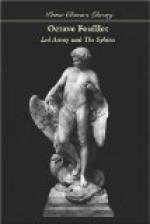“Alas! I am about to lose the oldest, and without doubt the most skillful, of these masters—the illustrious Jean Rostain. It was he, sir, who, on his arrival from Paris, two years ago, made this remarkable speech to me: ’A man of taste, Monsieur le Marquis, can no longer live in Paris; they practice there now, a certain romantic style of cooking which will lead us Heaven knows where!’ In short, sir, Rostain is a classic; this singular man has an opinion of his own! Well! you have just tasted in succession two entremets dishes of which cream forms the essential foundation; according to my idea, these dishes are both a success; but Rostain’s work has struck me as greatly superior. Ah, ah! sir, I am curious to know if you can of your own accord and upon that simple indication, assign to each tree its fruit, and render unto Caesar what belongs to Caesar. Ah, ah, let us see if you can!”
I cast a furtive glance at the remnants of the two dishes to which the marquis had just called my attention, and I had no hesitation in designating as “classic” the one that was surmounted with a temple of cupid, and a figure of that god in polychromatic pastry.
“A hit!” exclaimed the marquis. “Bravo! Rostain shall hear of it, and his heart will rejoice. Ah! monsieur, why has it not been my good fortune to receive you in my house a few days sooner? I might perhaps have kept Rostain, or, to speak more truly, Rostain might perhaps have kept me; for I cannot conceal the fact, gentlemen hunters, that you are not in the good graces of the old chef, and I am not far from attributing his departure with whatever pretexts he may choose to color it, to the annoyance he feels at your complete indifference. Thinking it might be agreeable to him, I informed him, a few weeks ago, that our hunting-meetings were about to secure him a concourse of connoisseurs worthy of his talents.”
“Monsiuer le Marquis will excuse me,” replied Rostain with a melancholy smile, “if I do not share his illusions; in the first place, the hunter devours and does not eat; he brings to the table the stomach of a man just saved from shipwreck, iratum ventrem, as Horace says, and swallows up without choice and without reflection, gulae parens, the most serious productions of an artist; in the second place, the violent exercise of the chase has developed in such guests an inordinate thirst, which they generally slake without moderation. Now, Monsieur le Marquis is not ignorant of the opinion of the ancients on the excessive use of wine during meals; it blunts the taste—ersurdant vina palatum! Nevertheless, Monsieur le Marquis may rest assured that I shall labor to please his guests with my usual conscientiousness, though with the painful certainty of not being understood.”
After uttering these words, Rostain draped himself in his toga, cast to heaven the look of an unappreciated genius, and left my study.




